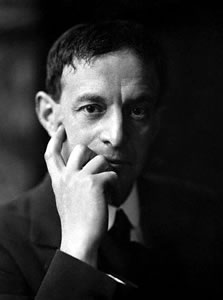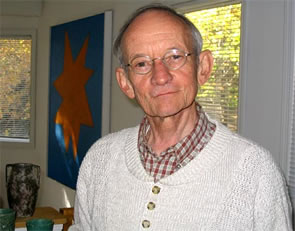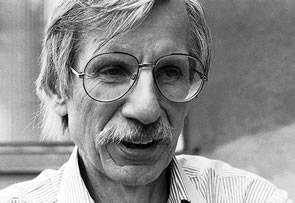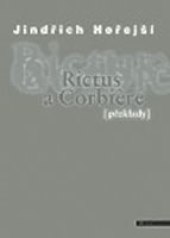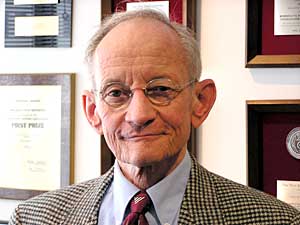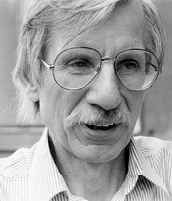De Engelse dichter, schrijver, criticus en letterkundige James Fenton werd geboren op 25 april 1949 in Lincoln. Fenton verwierf reeds als student in Oxford zijn eerste literaire prijs met een bundel van 23 sonnetten “Our Western Future” (1968). Hij was politiek en literair medewerker van de New Statesman, free lance reporter in Vietnam en verslaggever van The Guardian in de Bondsrepubliek Duitsland. Als journalist werd hij vooral bekend door zijn verslagen uit Vietnam en Cambodja. In 1982 brak hij door naar een breder publiek met de bundel “The Memory of War and Children of Exile” . Voordien publiceerde hij nog: “Terminal Moraine” (1972), “A vacant Possession” (1978), en “A German Requiem” (1978).
In Paris With You
Don’t talk to me of love. I’ve had an earful
And I get tearful when I’ve downed a drink or two.
I’m one of your talking wounded.
I’m a hostage. I’m maroonded.
But I’m in Paris with you.
Yes I’m angry at the way I’ve been bamboozled
And resentful at the mess I’ve been through.
I admit I’m on the rebound
And I don’t care where are we bound.
I’m in Paris with you.
Do you mind if we do not go to the Louvre
If we say sod off to sodding Notre Dame,
If we skip the Champs Elysées
And remain here in this sleazy
Old hotel room
Doing this and that
To what and whom
Learning who you are,
Learning what I am.
Don’t talk to me of love. Let’s talk of Paris,
The little bit of Paris in our view.
There’s that crack across the ceiling
And the hotel walls are peeling
And I’m in Paris with you.
D
on’t talk to me of love. Let’s talk of Paris.
I’m in Paris with the slightest thing you do.
I’m in Paris with your eyes, your mouth,
I’m in Paris with… all points south.
Am I embarrassing you?
I’m in Paris with you.
Wind
This is the wind, the wind in a field of corn.
Great crowds are fleeing from a major disaster
Down the green valleys, the long swaying wadis,
Down through the beautiful catastrophe of wind.
Families, tribes, nations, and their livestock
Have heard something, seen something. An expectation
Or a gigantic misunderstanding has swept over the hilltop
Bending the ear of the hedgerow with stories of fire and sword.
I saw a thousand years pass in two seconds.
Land was lost, languages rose and divided.
This lord went east and found safety.
His brother sought Africa and a dish of aloes.
Centuries, minutes later, one might ask
How the hilt of a sword wandered so far from the smithy.
And somewhere they will sing: ‘Like chaff we were borne
In the wind. ‘ This is the wind in a field of corn.
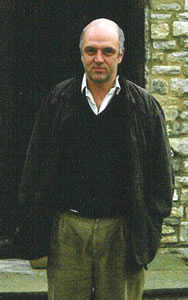
James Fenton (Lincoln, 25 april 1949)
De Engelse dichter Walter John de la Mare werd geboren op 25 april 1873 in Charlton, Kent. Zie ook mijn blog van 25 april 2007 en ook mijn blog van 25 april 2008.
All That’s Past
Very old are the woods;
And the buds that break
Out of the brier’s boughs,
When March winds wake,
So old with their beauty are–
Oh, no man knows
Through what wild centuries
Roves back the rose.
Very old are the brooks;
And the rills that rise
Where snow sleeps cold beneath
The azure skies
Sing such a history
Of come and gone,
Their every drop is as wise
As Solomon.
Very old are we men;
Our dreams are tales
Told in dim Eden
By Eve’s nightingales;
We wake and whisper awhile,
But, the day gone by,
Silence and sleep like fields
Of amaranth lie.
Wanderers
Wide are the meadows of night,
And daisies are shinng there,
Tossing their lovely dews,
Lustrous and fair;
And through these sweet fields go,
Wanderers amid the stars —
Venus, Mercury, Uranus, Neptune,
Saturn, Jupiter, Mars.
‘Tired in their silver, they move,
And circling, whisper and say,
Fair are the blossoming meads of delight
Through which we stray.
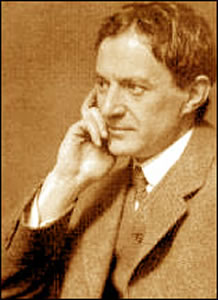
Walter John de la Mare (25 april 1873 – 22 juni 1956)
De Amerikaanse dichter Ted Kooser werd geboren op 25 april 1939 in Ames, Iowa. Zie ook mijn blog van 25 april 2007 en ook mijn blog van 25 april 2008.
Father
Today you would be ninety-seven
if you had lived, and we would all be
miserable, you and your children,
driving from clinic to clinic,
an ancient fearful hypochondriac
and his fretful son and daughter,
asking directions, trying to read
the complicated, fading map of cures.
But with your dignity intact
you have been gone for twenty years,
and I am glad for all of us, although
I miss you every day—the heartbeat
under your necktie, the hand cupped
on the back of my neck, Old Spice
in the air, your voice delighted with stories.
On this day each year you loved to relate
that the moment of your birth
your mother glanced out the window
and saw lilacs in bloom. Well, today
lilacs are blooming in side yards
all over Iowa, still welcoming you.
At the Cancer Clinic
She is being helped toward the open door
that leads to the examining rooms
by two young women I take to be her sisters.
Each bends to the weight of an arm
and steps with the straight, tough bearing
of courage. At what must seem to be
a great distance, a nurse holds the door,
smiling and calling encouragement.
How patient she is in the crisp white sails
of her clothes. The sick woman
peers from under her funny knit cap
to watch each foot swing scuffing forward
and take its turn under her weight.
There is no restlessness or impatience
or anger anywhere in sight. Grace
fills the clean mold of this moment
and all the shuffling magazines grow still.

Ted Kooser (Ames, 25 april 1939)
De Amerikaanse schrijver Ross Franklin Lockridge Jr. werd geboren op 25 april 1914 in Bloomington, Indiana. Hij studeerde af aan de Indiana University in 1935 met het hoogste gemiddelde in de geschiedenis van de universiteit. Zijn hoofdwerk, de roman Raintree County, verscheen in 1948. Het boek beschrijft de geschiedenis van het midwesten door de ogen van het hoofdpersonage John. Wickliff Shawnessy en werd door de kritiek zeer gunstig ontvangen. Lockridge echter leed aan zware depressies en pleegde kort na het verschijnen van de roman zelfmoord.
Uit: Raintree County
“–Everything but truth, wisdom, beauty, goodness, Mr. Shawnessy said. And love, he added, feeling a little embarrassed as he said it.
But Cash Carney went on smoking, his eyes staring, his left hand fondling the gold watch.
–John, the Perfessor said, you’re clinging to a way of life that’s doomed. Go and look at the modern City. How can anyone look at it and believe in love? Or morality? Or the Eternal Ideas? Or the Inalienable Rights? How can anyone believe in the real existence of Raintree County, which you, dear boy and endlessly courageous dreamer, have taken as your image of the enduring values of human life? Yes, go and look at the City, and then look at your little Raintree County, child. Shed a nostalgic tear for it, because the City’s going to eat it up. The God of the City is going to kill the ancient God of Raintree County, who has nothing but a couple of stone tablets and a golden rule for weapons.
–Still corrupting the youth, I see, Cash Carney said. Don’t believe him, John. He’s the same old Perfessor and hasn’t changed a bit.
–What is this? Mr. Shawnessy said. A contest for my soul?
The Perfessor laughed.
–I don’t know why it is, he said, but everybody was always trying to corrupt you, John.
Mr. Shawnessy slowly lit a cigar and watched the smoke ascend.
Good-by to Raintree County, incorrigible enthusiast of ideas. Good-by to the good small roads of Raintree County, the horse-and-buggy roads. Hard roads and wide
will run through Raintree County, and its ancient boundaries will dissolve. People will hunt it on the map, and it won’t be there.
For America will become the City. America will hunt for a tree of life whose fruit is gold. And that man shall be the Hero of the County who plucks from the high branches the heaviest dividends. And he shall get the most beautiful woman of the City, and he shall lie all night betwixt her breasts. And she will cheat him too, and cheat you too, because she is the City.”

Ross Franklin Lockridge Jr. (25 april 1914 – 6 maart 1948)
De Duitse dichter en schrijver Richard Anders werd geboren op 25 april 1928 in Ortelsburg, tegenwoordig Szczytno, Polen. Zie ook mijn blog van 25 april 2007 en ook mijn blog van 25 april 2008.
Aus der Traum
Leere Mauern
falsche Spiegel
graue Tränen
Man versucht mit den Flügeln
der Statuen zu fliegen
aber der Wind kommt nicht
schläft irgendwo faul
Bevor sie diese trostlose
Gegend erreicht haben
stürzen Wolken vom Himmel
Ihre unförmigen Trümmer
liegen auf den Plätzen umher
Die Pendeluhren haben Ausgangssperre
Sprache
Hommage á André Breton
Aus grünem Schnee äugt der Salpetervogel
und seine Garderobe
leuchtet wie alle sieben vergoldeten Samen
auf ihren Kerzen unter der Nacht
Im gänzlich erblindeten Wind
segelte Sprache
Korvette auf blauer Zunge
die Taub aus den Felsen hing
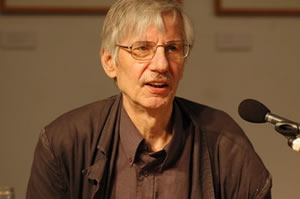
Richard Anders (Ortelsburg, 25 april 1928)
De Spaanse schrijver Leopoldo Alas (eig. Leopoldo Enrique García Alas y Ureña) werd geboren op 25 april 1852 in Zamora. In 1869 schreef hij zich in aan de rechtenfaculteit van de universiteit van Oviedo en drie jaar later haalde hij er zijn diploma. Zijn literaire en vooral journalistieke drang deden hem in 1871 besluiten naar Madrid te verhuizen om daar te doctoreren en tezelfdertijd letteren te studeren. Het Madrileense dagblad El solfeo gaf hem zijn eerste kans als journalist en verhalenschrijver en op 11 april 1875 verscheen voor het eerst een artikel van hem onder het pseudoniem ‘Clarín’. Het jaar daarop publiceerde hij zijn eerste verhaal, Estilicón. Het jaar 1884 was een beslissend jaar voor Alas, zowel op professioneel als op persoonlijk vlak: hij begon La Regenta te schrijven en zijn eerste zoon werd geboren. Deze laatste gebeurtenis compenseerde het verdriet voor de dood van zijn vader even daarna. Het jaar daarop publiceerde hij twee volumes van zijn grote roman. In 1893 verscheen zijn eerste collectie verhalen, El Señor y los demás son cuentos, en in 1895 ging zijn drama Teresa in première in het Teatro Español in Madrid.
Uit: Socrates’ Rooster (El gallo de Sócrates)
“ After closing his master’s eyes and mouth Crito left the rest of the disciples around the dead body and left the jail, prepared to make good, as soon as possible, on the last errand that Socrates had given him. Maybe it was in jest, but doubting whether it was in earnest or not, he interpreted it literally,
For upon dying and showing his disciples the sad, vulgar spectacle of his death, Socrates had said:
“Crito, we owe rooster to Esculapius, don’t forget to pay this debt,” and he spoke no more, these being his last words.
That request was sacred for Crito. He didn’t wish to analyze it, didn’t wish to examine if it were more realistic that Socrates has only told a slightly ironic joke. Or if it were the last will of his master, his last desire. Hadn’t Socrates, contrary to Antitus’ and Melitus’ calumny, always been respectful toward the popular cult and the official religion? Of he course he gave myths (which Crito didn’t refer to in this way, of course) a symbolic, philosophical as well as a very sublime and idealistic interpretation but, amidst his poetic and transcendental paraphrases, he still respected the faith of the Greeks including the positive religion and state cult.
A beautiful episode from his last speech demonstrated this well (Crito noted that sometimes Socrates, in spite of his philosophical system of questions and answers, he would forget about his listeners and speak at length in a very flowery manner). He had depicted the marvels of the other world with topographic detail which contained more traditional imagination than rigorous dialectic and austere philosophy. And Socrates hadn’t said he didn’t believe in all that. Although, neither did he affirm the reality of what he described with the absolute certitude of a fanatic.”

Leopoldo Alas (25 april 1852 – 13 juni 1901)
De Duitse dichter en schrijver Julius Waldemar Grosse werd geboren op 25 april 1828 in Erfurt.Vanaf 1849 studeerde hij rechten in Halle. In 1851 werden zijn eerste stukken opgevoerd en die hadden zo’n succes dat hij met de studie besloot te stoppen. In 1852 trok hij naar München, waar hij een tijdje schilderkunst studeerde. Samen met Paul Heyse richtte hij in 1854 de schrijversgroep “Die Krokodile” op. Van 1855 tot 1861 was hijn theatercriticus bij de Neue Münchner Zeitung. Vanaf 1869 leefde hij afwisselend in Dresden en Weimar, waar hij secretaris-generaal van de Schillerstiftung was.
Sehnsucht, auf den Knien…
Sehnsucht, auf den Knien
Schautest du himmelwärts –
Einzelne Wolken ziehen,
Kommen und entfliehen,
Ewig hofft das Herz.
Liebe – himmlisch Wallen
Goldener Jugendzeit –
Einzelne Strahlen fallen
Wie durch Pfeilerhallen
In das Leben weit.
Einsam in alten Tagen
Lächelt Erinnerung;
Einzelne Wellen schlagen
Rauschen herauf wie Sagen:
Herz, auch du warst jung!
Lebensüberfluß
Rauschende Bäche quellenden Lebens,
Tönet wie Lieder in meine Ruh!
Sehet, erfüllt ist’s: nimmer vergebens
Schau’ ich in Sehnsucht den Wellen zu.
Draußen in sommerdämmernder Laube
Wiegt die holde Geliebte mein Kind,
Hoch an dem Dache reift mir die Traube,
Goldne Fäden die Parze spinnt.
Schwellende Segel auf ruhigen Wogen
Bringen mir Gäste, Früchte und Fracht;
Meine Auen sind bienenumflogen,
Nachtigallen singen bei Nacht.
Rauschende Bäche quellenden Lebens,
Spült ihr mich fort einst in Wogenschaum,
Singen dann will ich: nicht vergebens
Hab’ ich geträumt den irdischen Traum!
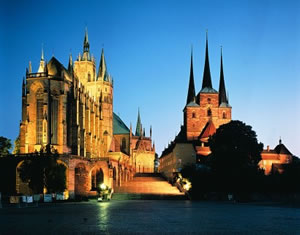
Julius Grosse (25 april 1828 – 9 mei 1902)
Erfurt (Geen portret beschikbaar)
De Duitse dichter en schrijver Sigmund von Birken werd geboren op 25 april 1626 in Wildstein nabij Eger. Hij was de enig echt vrije schrijver uit de tijd van de Barok. In 1645 werd hij benoemd tot opvoeder van de prinsen aan het hof van hertog August d. J. von Braunschweig-Lüneburg. In 1646 verliet hij het hof al weer om door het noorden van Duitsland te trekken. Vanaf 1662 blies hij de literaire vereniging “Der Pegnesische Blumenorden” in Neurenberg weer nieuw leven in die na het overlijden van de oprichter Harsdörffer inactief geworden was. Hij vergrootte het aanzien van de orde en daarmee het belang van de literauur.
Leben Tod, Tod Leben
Nur ein Tod ist dieses Leben,
Nichts als eine Grabesbahn.
Wann zu leben wir anheben,
Fahen wir zu sterben an.
Unser Tod ist jede Noth,
Die uns wünschen macht den Tod.
Von des Leibes Knochenwagen
Wird die Seele fortgetragen.
Tod, du giebst das rechte Leben,
Dies hier ist der wahre Tod.
Himmelauf, dahin wir streben,
Holst du uns, du lieber Both’!
Den du führest bald zur Ruh’,
Dessen bester Freund bist du.
Schneller Tod ist kein Verderben,
Gottgeliebte fertig sterben.
Christen wie der Phönix sterben,
Werden lebend in dem Grab.
Wer im Sternenhaus will erben,
Muß die Erde legen ab.
Wann die Sonne eilt der Ruh’
In den Wintertagen zu,
Sie läßt nach dem Untergehen
In der andern Welt sich sehen.
Jesus hier mit seinen Lieben
Aus dem todten Leben eilt,
Und mit ihnen, ohn’ Verschieben,
Seine Himmelsfreude theilt.
Fahre, spricht er, hin, mein Boot!
Führ’ mir diese aus dem Tod!
Laßt den todten Leib verderben!
Hört er doch nur auf zu sterben.

Sigmund von Birken (25 april 1626 – 21 juni 1681)
Zie voor onderstaande schrijver ook mijn blog van 25 april 2008.
De Tsjechische dichter en vertaler Jindřich Hořejší werd geboren op 25 april 1886 in Praag.

